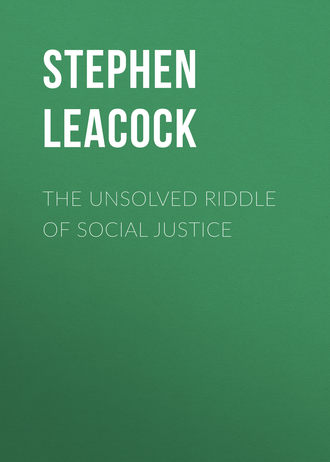
Стивен Ликок
The Unsolved Riddle of Social Justice
II.—Life, Liberty and the Pursuit of Happiness
"ALL men," wrote Thomas Jefferson in framing the Declaration of Independence, "have an inalienable right to life, liberty and the pursuit of happiness." The words are more than a felicitous phrase. They express even more than the creed of a nation. They embody in themselves the uppermost thought of the era that was dawning when they were written. They stand for the same view of society which, in that very year of 1776, Adam Smith put before the world in his immortal "Wealth of Nations" as the "System of Natural Liberty." In this system mankind placed its hopes for over half a century and under it the industrial civilization of the age of machinery rose to the plenitude of its power.
In the preceding chapter an examination has been made of the purely mechanical side of the era of machine production. It has been shown that the age of machinery has been in a certain sense one of triumph, of the triumphant conquest of nature, but in another sense one of perplexing failure. The new forces controlled by mankind have been powerless as yet to remove want and destitution, hard work and social discontent. In the midst of accumulated wealth social justice seems as far away as ever.
It remains now to discuss the intellectual development of the modern age of machinery and the way in which it has moulded the thoughts and the outlook of mankind.
Few men think for themselves. The thoughts of most of us are little more than imitations and adaptations of the ideas of stronger minds. The influence of environment conditions, if it does not control, the mind of man. So it comes about that every age or generation has its dominant and uppermost thoughts, its peculiar way of looking at things and its peculiar basis of opinion on which its collective action and its social regulations rest. All this is largely unconscious. The average citizen of three generations ago was probably not aware that he was an extreme individualist. The average citizen of to-day is not conscious of the fact that he has ceased to be one. The man of three generations ago had certain ideas which he held to be axiomatic, such as that his house was his castle, and that property was property and that what was his was his. But these were to him things so obvious that he could not conceive any reasonable person doubting them. So, too, with the man of to-day. He has come to believe in such things as old age pensions and national insurance. He submits to bachelor taxes and he pays for the education of other people's children; he speculates much on the limits of inheritance, and he even meditates profound alterations in the right of property in land. His house is no longer his castle. He has taken down its fences, and "boulevarded" its grounds till it merges into those of his neighbors. Indeed he probably does not live in a house at all, but in a mere "apartment" or subdivision of a house which he shares with a multiplicity of people. Nor does he any longer draw water from his own well or go to bed by the light of his own candle: for such services as these his life is so mixed up with "franchises" and "public utilities" and other things unheard of by his own great-grandfather, that it is hopelessly intertangled with that of his fellow citizens. In fine, there is little left but his own conscience into which he can withdraw.
Such a man is well aware that times have changed since his great-grandfather's day. But he is not aware of the profound extent to which his own opinions have been affected by the changing times. He is no longer an individualist. He has become by brute force of circumstances a sort of collectivist, puzzled only as to how much of a collectivist to be.
Individualism of the extreme type is, therefore, long since out of date. To attack it is merely to kick a dead dog. But the essential problem of to-day is to know how far we are to depart from its principles. There are those who tell us—and they number many millions—that we must abandon them entirely. Industrial society, they say, must be reorganized from top to bottom; private industry must cease. All must work for the state; only in a socialist commonwealth can social justice be found. There are others, of whom the present writer is one, who see in such a programme nothing but disaster: yet who consider that the individualist principle of "every man for himself" while it makes for national wealth and accumulated power, favors overmuch the few at the expense of the many, puts an over-great premium upon capacity, assigns too harsh a punishment for easy indolence, and, what is worse, exposes the individual human being too cruelly to the mere accidents of birth and fortune. Under such a system, in short, to those who have is given and from those who have not is taken away even that which they have. There are others again who still view individualism just as the vast majority of our great-grandfathers viewed it, as a system hard but just: as awarding to every man the fruit of his own labor and the punishment of his own idleness, and as visiting, in accordance with the stern but necessary ordination of our existence, the sins of the father upon the child.
The proper starting point, then, for all discussion of the social problem is the consideration of the individualist theory of industrial society. This grew up, as all the world knows, along with the era of machinery itself. It had its counterpart on the political side in the rise of representative democratic government. Machinery, industrial liberty, political democracy—these three things represent the basis of the progress of the nineteenth century.
The chief exposition of the system is found in the work of the classical economists—Adam Smith and his followers of half a century—who created the modern science of political economy. Beginning as controversialists anxious to overset a particular system of trade regulation, they ended by becoming the exponents of a new social order. Modified and amended as their system is in its practical application, it still largely conditions our outlook to-day. It is to this system that we must turn.
The general outline of the classical theory of political economy is so clear and so simple that it can be presented within the briefest compass. It began with certain postulates, or assumptions, to a great extent unconscious, of the conditions to which it applied. It assumed the existence of the state and of contract. It took for granted the existence of individual property, in consumption goods, in capital goods, and, with a certain hesitation, in land. The last assumption was not perhaps without misgivings: Adam Smith was disposed to look askance at landlords as men who gathered where they had not sown. John Stuart Mill, as is well known, was more and more inclined, with advancing reflection, to question the sanctity of landed property as the basis of social institutions. But for the most part property, contract and the coercive state were fundamental assumptions with the classicists.
With this there went, on the psychological side, the further assumption of a general selfishness or self-seeking as the principal motive of the individual in the economic sphere. Oddly enough this assumption—the most warrantable of the lot—was the earliest to fall under disrepute. The plain assertion that every man looks out for himself (or at best for himself and his immediate family) touches the tender conscience of humanity. It is an unpalatable truth. None the less it is the most nearly true of all the broad generalizations that can be attempted in regard to mankind.
The essential problem then of the classicists was to ask what would happen if an industrial community, possessed of the modern control over machinery and power, were allowed to follow the promptings of "enlightened selfishness" in an environment based upon free contract and the right of property in land and goods. The answer was of the most cheering description. The result would be a progressive amelioration of society, increasing in proportion to the completeness with which the fundamental principles involved were allowed to act, and tending ultimately towards something like a social millennium or perfection of human society. One easily recalls the almost reverent attitude of Adam Smith towards this system of industrial liberty which he exalted into a kind of natural theology: and the way in which Mill, a deist but not a Christian, was able to fit the whole apparatus of individual liberty into its place in an ordered universe. The world "runs of itself," said the economist. We have only to leave it alone. And the maxim of laissez faire became the last word of social wisdom.
The argument of the classicists ran thus. If there is everywhere complete economic freedom, then there will ensue in consequence a régime of social justice. If every man is allowed to buy and sell goods, labor and property, just as suits his own interest, then the prices and wages that result are either in the exact measure of social justice or, at least, are perpetually moving towards it. The price of any commodity at any moment is, it is true, a "market price," the resultant of the demand and the supply; but behind this operates continually the inexorable law of the cost of production. Sooner or later every price must represent the actual cost of producing the commodity concerned, or, at least, must oscillate now above and now below that point which it is always endeavoring to meet. For if temporary circumstances force the price well above the cost of producing the article in question, then the large profits to be made induce a greater and greater production. The increased volume of the supply thus produced inevitably forces down the price till it sinks to the point of cost. If circumstances (such, for example, as miscalculation and an over-great supply) depress the price below the point of cost, then the discouragement of further production presently shortens the supply and brings the price up again. Price is thus like an oscillating pendulum seeking its point of rest, or like the waves of the sea rising and falling about its level. By this same mechanism the quantity and direction of production, argued the economists, respond automatically to the needs of humanity, or, at least, to the "effective demand," which the classicist mistook for the same thing. Just as much wheat or bricks or diamonds would be produced as the world called for; to produce too much of any one thing was to violate a natural law; the falling price and the resulting temporary loss sternly rebuked the producer.
In the same way the technical form and mechanism of production were presumed to respond to an automatic stimulus. Inventions and improved processes met their own reward. Labor, so it was argued, was perpetually being saved by the constant introduction of new uses of machinery.
By a parity of reasoning, the shares received by all the participants and claimants in the general process of production were seen to be regulated in accordance with natural law. Interest on capital was treated merely as a particular case under the general theory of price. It was the purchase price needed to call forth the "saving" (a form, so to speak, of production) which brought the capital into the market. The "profits" of the employer represented the necessary price paid by society for his services, just enough and not more than enough to keep him and his fellows in operative activity, and always tending under the happy operation of competition to fall to the minimum consistent with social progress.
Rent, the share of the land-owner, offered to the classicist a rather peculiar case. There was here a physical basis of surplus over cost. But, granted the operation of the factors and forces concerned, rent emerged as a differential payment to the fortunate owner of the soil. It did not in any way affect prices or wages, which were rendered neither greater nor less thereby. The full implication of the rent doctrine and its relation to social justice remained obscured to the eye of the classical economist; the fixed conviction that what a man owns is his own created a mist through which the light could not pass.
Wages, finally, were but a further case of value. There was a demand for labor, represented by the capital waiting to remunerate it, and a supply of labor represented by the existing and increasing working class. Hence wages, like all other shares and factors, corresponded, so it was argued, to social justice. Whether wages were high or low, whether hours were long or short, at least the laborer like everybody else "got what was coming to him." All possibility of a general increase of wages depended on the relation of available capital to the numbers of the working men.
Thus the system as applied to society at large could be summed up in the consoling doctrine that every man got what he was worth, and was worth what he got; that industry and energy brought their own reward; that national wealth and individual welfare were one and the same; that all that was needed for social progress was hard work, more machinery, more saving of labor and a prudent limitation of the numbers of the population.
The application of such a system to legislation and public policy was obvious. It carried with it the principle of laissez-faire. The doctrine of international free trade, albeit the most conspicuous of its applications, was but one case under the general law. It taught that the mere organization of labor was powerless to raise wages; that strikes were of no avail, or could at best put a shilling into the pocket of one artisan by taking it out of that of another; that wages and prices could not be regulated by law; that poverty was to a large extent a biological phenomenon representing the fierce struggle of germinating life against the environment that throttles part of it. The poor were like the fringe of grass that fades or dies where it meets the sand of the desert. There could be no social remedy for poverty except the almost impossible remedy of the limitation of life itself. Failing this the economist could wash his hands of the poor.
These are the days of relative judgments and the classical economy, like all else, must be viewed in the light of time and circumstance. With all its fallacies, or rather its shortcomings, it served a magnificent purpose. It opened a road never before trodden from social slavery towards social freedom, from the mediæval autocratic régime of fixed caste and hereditary status towards a régime of equal social justice. In this sense the classical economy was but the fruition, or rather represented the final consciousness of a process that had been going on for centuries, since the breakdown of feudalism and the emancipation of the serf. True, the goal has not been reached. The vision of the universal happiness seen by the economists has proved a mirage. The end of the road is not in sight. But it cannot be doubted that in the long pilgrimage of mankind towards social betterment the economists guided us in the right turning. If we turn again in a new direction, it will at any rate not be in the direction of a return to autocratic mediævalism.
But when all is said in favor of its historic usefulness, the failures and the fallacies of natural liberty have now become so manifest that the system is destined in the coming era to be revised from top to bottom. It is to these failures and fallacies that attention will be drawn in the next chapter.
III.—The Failures and Fallacies of Natural Liberty
THE rewards and punishments of the economic world are singularly unequal. One man earns as much in a week or even in a day as another does in a year. This man by hard, manual labor makes only enough to pay for humble shelter and plain food. This other by what seems a congenial activity, fascinating as a game of chess, acquires uncounted millions. A third stands idle in the market place asking in vain for work. A fourth lives upon rent, dozing in his chair, and neither toils nor spins. A fifth by the sheer hazard of a lucky "deal" acquires a fortune without work at all. A sixth, scorning to work, earns nothing and gets nothing; in him survives a primitive dislike of labor not yet fully "evoluted out;" he slips through the meshes of civilization to become a "tramp," cadges his food where he can, suns his tattered rags when it is warm and shivers when it is cold, migrating with the birds and reappearing with the flowers of spring.
Yet all are free. This is the distinguishing mark of them as children of our era. They may work or stop. There is no compulsion from without. No man is a slave. Each has his "natural liberty," and each in his degree, great or small, receives his allotted reward.
But is the allotment correct and the reward proportioned by his efforts? Is it fair or unfair, and does it stand for the true measure of social justice?
This is the profound problem of the twentieth century.
The economists and the leading thinkers of the nineteenth century were in no doubt about this question. It was their firm conviction that the system under which we live was, in its broad outline, a system of even justice. They held it true that every man under free competition and individual liberty is awarded just what he is worth and is worth exactly what he gets: that the reason why a plain laborer is paid only two or three dollars a day is because he only "produces" two or three dollars a day: and that why a skilled engineer is paid ten times as much is because he "produces" ten times as much. His work is "worth" ten times that of the plain laborer. By the same reasoning the salary of a corporation president who receives fifty thousand dollars a year merely reflects the fact that the man produces—earns—brings in to the corporation that amount or even more. The big salary corresponds to the big efficiency.
And there is much in the common experience of life and the common conduct of business that seems to support this view. It is undoubtedly true if we look at any little portion of business activity taken as a fragment by itself. On the most purely selfish grounds I may find that it "pays" to hire an expert at a hundred dollars a day, and might find that it spelled ruin to attempt to raise the wages of my workingmen beyond four dollars a day. Everybody knows that in any particular business at any particular place and time with prices at any particular point, there is a wage that can be paid and a wage that can not. And everybody, or nearly everybody, bases on these obvious facts a series of entirely erroneous conclusions. Because we cannot change the part we are apt to think we cannot change the whole. Because one brick in the wall is immovable, we forget that the wall itself might be rebuilt.
The single employer rightly knows that there is a wage higher than he can pay and hours shorter than he can grant. But are the limits that frame him in, real and necessary limits, resulting from the very nature of things, or are they mere products of particular circumstances? This, as a piece of pure economics, does not interest the individual employer a particle. It belongs in the same category as the question of the immortality of the soul and other profundities that have nothing to do with business. But to society at large the question is of an infinite importance.
Now the older economists taught, and the educated world for about a century believed, that these limitations which hedged the particular employer about were fixed and assigned by natural economic law. They represented, as has been explained, the operation of the system of natural liberty by which every man got what he is worth. And it is quite true that the particular employer can no more break away from these limits than he can jump out of his own skin. He can only violate them at the expense of ceasing to be an economic being at all and degenerating into a philanthropist.
But consider for a moment the peculiar nature of the limitations themselves. Every man's limit of what he can pay and what he can take, of how much he can offer and how much he will receive, is based on the similar limitations of other people. They are reciprocal to one another. Why should one factory owner not pay ten dollars a day to his hands? Because the others don't. But suppose they all do? Then the output could not be sold at the present price. But why not sell the produce at a higher price? Because at a higher price the consumer can't afford to buy it. But suppose that the consumer, for the things which he himself makes and sells, or for the work which he performs, receives more? What then? The whole thing begins to have a jigsaw look, like a child's toy rack with wooden soldiers on it, expanding and contracting. One searches in vain for the basis on which the relationship rests. And at the end of the analysis one finds nothing but a mere anarchical play of forces, nothing but a give-and-take resting on relative bargaining strength. Every man gets what he can and gives what he has to.
Observe that this is not in the slightest the conclusion of the orthodox economists. Every man, they said, gets what he actually makes, or, by exchange, those things which exactly correspond to it as regards the cost of making them—which have, to use the key-word of the theory, the same value. Let us take a very simple example. If I go fishing with a net which I have myself constructed out of fibers and sticks, and if I catch a fish and if I then roast the fish over a fire which I have made without so much as the intervention of a lucifer match, then it is I and I alone who have "produced" the roast fish. That is plain enough. But what if I catch the fish by using a hired boat and a hired net, or by buying worms as bait from some one who has dug them? Or what if I do not fish at all, but get my roast fish by paying for it a part of the wages I receive for working in a saw mill? Here are a new set of relationships. How much of the fish is "produced" by each of the people concerned? And what part of my wages ought I to pay in return for the part of the fish that I buy?
Here opens up, very evidently, a perfect labyrinth of complexity. But it was the labyrinth for which the earlier economist held, so he thought, the thread. No matter how dark the passage, he still clung tight to it. And his thread was his "fundamental equation of value" whereby each thing and everything is sold (or tends to be sold) under free competition for exactly its cost of production. There it was; as simple as A. B. C.; making the cost of everything proportional to the cost of everything else, and in itself natural and just; explaining and justifying the variations of wages and salaries on what seems a stern basis of fact. Here is your selling price as a starting point. Given that, you can see at once the reason for the wages paid and the full measure of the payment. To pay more is impossible. To pay less is to invite a competition that will force the payment of more. Or take, if you like, the wages as the starting point: there you are again,—simplicity itself: the selling price will exactly and nicely correspond to cost. True, a part of the cost concerned will be represented not by wages, but by cost of materials; but these, on analysis, dissolve into past wages. Hence the whole process and its explanation revolves around this simple fundamental equation that selling value equals the cost of production.
This was the central part of the economic structure. It was the keystone of the arch. If it holds, all holds. Knock it out and the whole edifice falls into fragments.
A technical student of the schools would digress here, to the great confusion of the reader, into a discussion of the controversy in the economic cloister between the rival schools of economists as to whether cost governs value or value governs cost. The point needs no discussion here, but just such fleeting passing mention as may indicate that the writer is well and wearily conversant with it.
The fundamental equation of the economist, then, is that the value of everything is proportionate to its cost. It requires no little hardihood to say that this proposition is a fallacy. It lays one open at once, most illogically, to the charge of being a socialist. In sober truth it might as well lay one open to the charge of being an ornithologist. I will not, therefore, say that the proposition that the value of everything equals the cost of production is false. I will say that it is true; in fact, that is just as true as that two and two make four: exactly as true as that, but let it be noted most profoundly, only as true as that. In other words, it is a truism, mere equation in terms, telling nothing whatever. When I say that two and two make four I find, after deep thought, that I have really said nothing, or nothing that was not already said at the moment I defined two and defined four. The new statement that two and two make four adds nothing. So with the majestic equation of the cost of production. It means, as far as social application goes, as far as any moral significance or bearing on social reform and the social outlook goes, absolutely nothing. It is not in itself fallacious; how could it be? But all the social inferences drawn from it are absolute, complete and malicious fallacies.
Any socialist who says this, is quite right. Where he goes wrong is when he tries to build up as truth a set of inferences more fallacious and more malicious still.
But the central economic doctrine of cost can not be shaken by mere denunciation. Let us examine it and see what is the matter with it. We restate the equation.
Under perfectly free competition the value or selling price of everything equals, or is perpetually tending to equal, the cost of its production. This is the proposition itself, and the inferences derived from it are that there is a "natural price" of everything, and that all "natural prices" are proportionate to cost and to one another; that all wages, apart from temporary fluctuations, are derived from, and limited by, the natural prices paid for the things made: that all payments for the use of capital (interest) are similarly derived and similarly limited; and that consequently the whole economic arrangement, by giving to each person exactly and precisely the fruit of his own labor, conforms exactly to social justice.
Now the trouble with the main proposition just quoted is that each side of the equation is used as the measure of the other. In order to show what natural price is, we add up all the wages that have been paid, and declare that to be the cost and then say that the cost governs the price. Then if we are asked why are wages what they are, we turn the argument backward and say that since the selling price is so and so the wages that can be paid out of it only amount to such and such. This explains nothing. It is a mere argument in a circle. It is as if one tried to explain why one blade of a pair of scissors is four inches long by saying that it has to be the same length as the other. This is quite true of either blade if one takes the length of the other for granted, but as applied to the explanation of the length of the scissors it is worse than meaningless.







